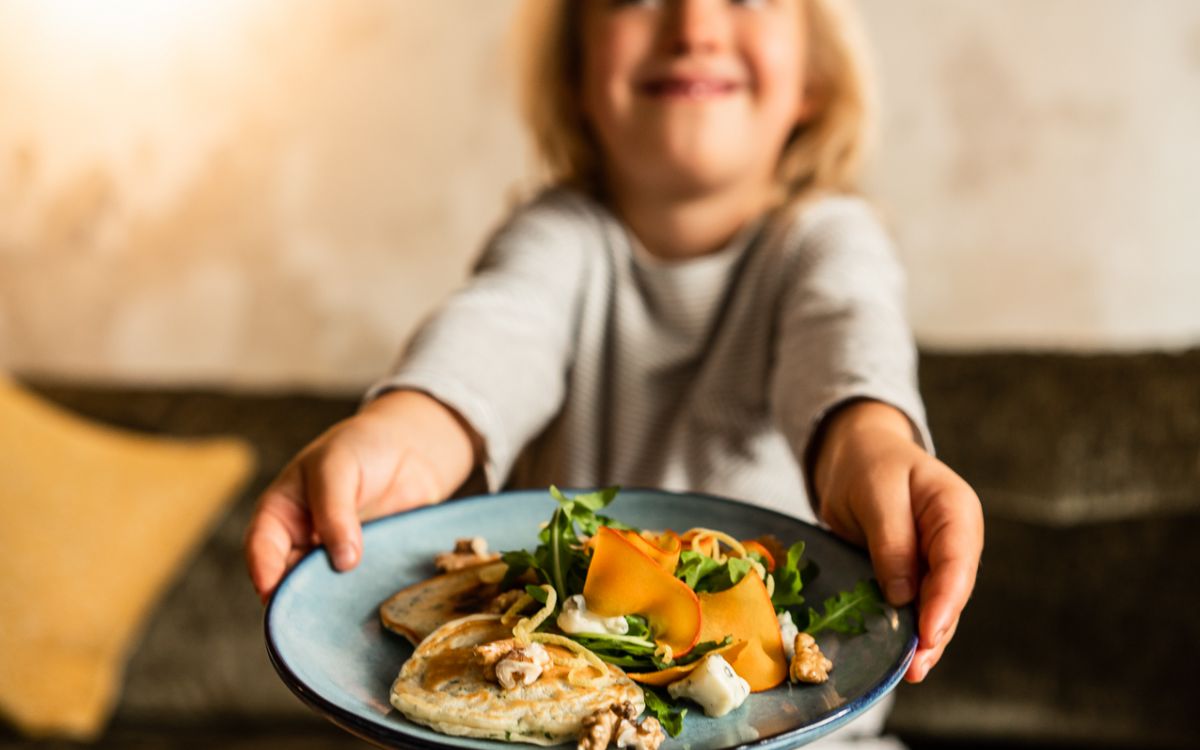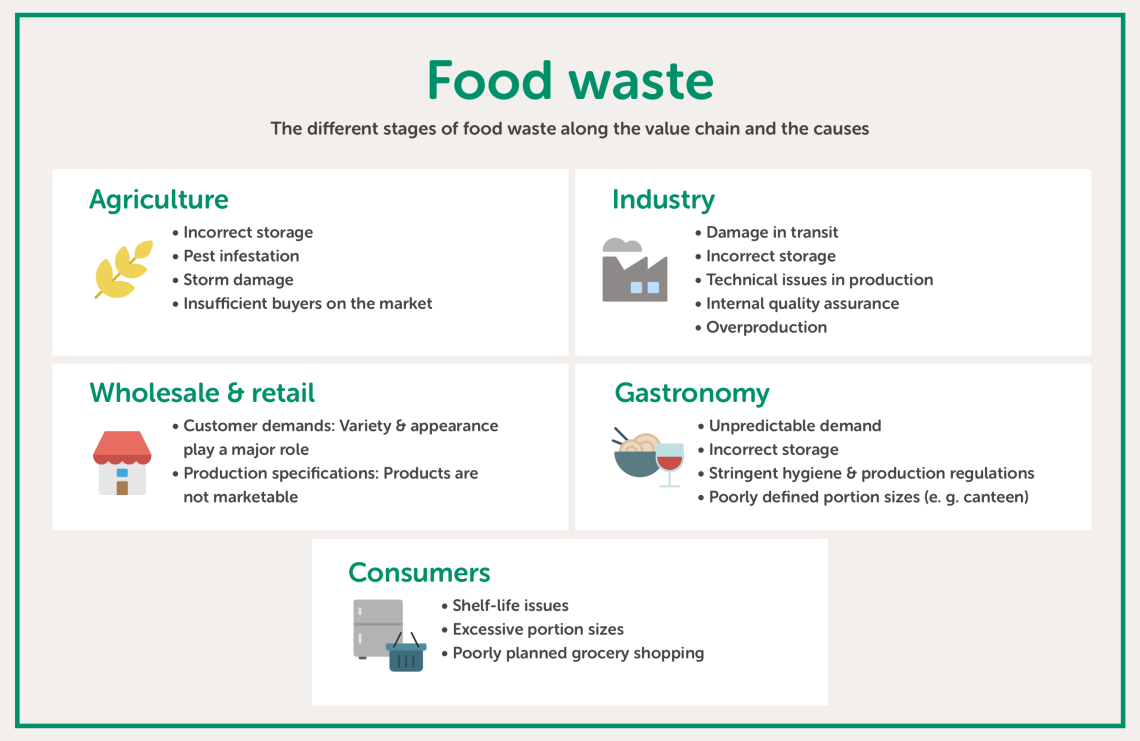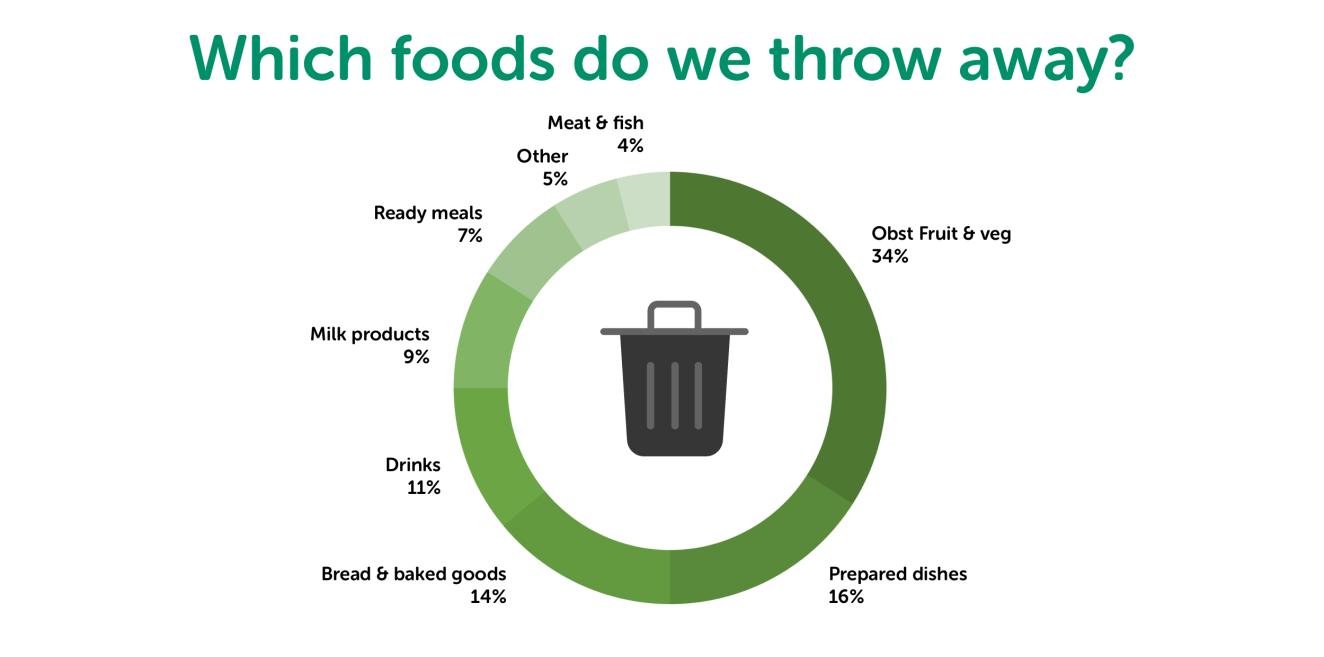On the plate, not in the bin: 10 tips for food rescue

If you save food, you’re not only doing something good for the environment, but also protecting your wallet. Here are some simple tips to help you waste less food and make a sustainable change.
You forgot the yoghurt at the back of the fridge and find that it’s gone mouldy. Or you wouldn't buy the lettuce in the supermarket as it had a wilted leaf. You’re unsure about the products in your fridge that are about to go out of date, and just don’t know what to make with them.
Sound familiar? You’re not alone. Many people have had the same experience, as have I. We are aware of this issue and want to make a change, but achieving it isn’t so easy. Don’t give up! At the end of this article, I will tell you which tips and gadgets helped me to reduce food waste.
Why is so much food thrown away?
There are many reasons for food waste. Although we, as end consumers, are largely to blame for food waste, food is discarded at various stages of the entire value chain. Here is an overview of where and why this happens:

Inhaltliche Quelle: https://www.welthungerhilfe.de/lebensmittelverschwendung
The best-before date is the most common reason for disposing of food
It seems that many people still consider the best-before date (BBD) to be an expiry date. At 58%, the BBD is the most common reason for throwing food away.(2) But what does the BBD actually tell us? The BBD is the manufacturer’s way of guaranteeing that a product will retain its specific characteristics (e.g. smell, taste and nutritional value) until the given date. This includes the precondition that the product has not been opened and has been stored properly. How to store the product can be found on the label. If stored correctly, products can often be enjoyed even beyond the BBD. In addition, many manufacturers err “on the side of caution” and specify an early BBD.(3)
The following applies: Rely on your senses, just like you do with fresh produce. Look, smell and taste – everything as expected? Then tuck in, even after the BBD!
CAUTION! Use-by date
If a “use-by date” is given on a food label, the product must not be consumed after that date. This will constitute a health risk. The use-by date is prescribed for perishable foods such as minced meat or fresh fish and should not be confused with the BBD.(4)
Which foods most often end up in bin?
In Germany, fruit and vegetables are the products most commonly thrown away. This is followed by ready-prepared dishes, bread and baked goods. But other food groups, such as drinks, dairy products, convenience foods, as well as meat and fish, also land in the bin.

Source: https://www.welthungerhilfe.de/lebensmittelverschwendung/
Why is it that we consumers account for the majority of food waste?
The answer is simply habit. We are accustomed to the fact that food is always available. We are used to going to the supermarket and (at least most of the time) finding everything we’d like. And that is why, unfortunately, we are also used to disposing of food that we no longer think is any good or that has been lingering at the back of the store cupboard. But how do you shrug off a habit that you have subconsciously acquired over so many years?
“Habit is habit, and not to be flung out of the window by any man, but coaxed down-stairs one step at a time” (Mark Twain)
Unfortunately, this is also the case with food waste. We can try to plan our shopping perfectly from one day to the next so that nothing is thrown away. And if that works, so much the better. Unfortunately, this approach is seldom realistic. As soon as something doesn’t work out or something unexpected happens, there is a great temptation to revert to old habits. We’re all familiar with this syndrome.
To ensure sustainable change, we must gradually abandon our habits, step by step. Some simple tips are provided below to help you achieve the major goal of reducing food waste at your own pace.
10 tips for reducing food waste
- Raise awareness
Since you’re reading this, you’ve already taken the first step. You’re looking for information and obviously want to make a change. Keep it up! - Plan your shopping
You may wonder “how do I know what I want to eat over the next few days” or believe “it takes far too much time”. Understandable. That’s what I thought. But to be honest, how often do we stand in the supermarket or in front of the fridge without a plan and not know what to buy or eat. Compared to this, a plan saves us time and, above all, stress.Tip: Sit down on Sunday and think about the week ahead: When and what do I want to eat, and then what ingredients will I need? This can even turn into a pleasant Sunday ritual with your partner or the whole family. Why not try it? - Never go shopping on an empty stomach
Sounds stupid, but for me a tip that is worth its weight in gold. When we are hungry, the shopping trolley fills itself. This not only makes a dent in your wallet, but often leads to food waste. Tip: Coffee can also reduce hunger pangs. - Give imperfect fruit and vegetables a chance
The lettuce has a wilted leaf or a carrot is slightly crooked? Many of these products do not even make it into the shops, and if they do, we often leave them there. Take courage and have a heart for the outsiders. It’s what’s inside that counts and in most cases they are at least as good. - Storing food correctly
Correct storage can help to make food enjoyable for much longer. For example, you can read about the best way to store products on the website of the Office for Consumer Protection. You will also find a clear illustration there. - Understanding the best-before date
As mentioned earlier in the article, the best-before date is not an expiry date and food can be eaten beyond that date. Rely on your senses: Look, smell, taste. - Extending the shelf life of your food
Still got various apples at home that are already slightly wrinkled? Your grandma would know immediately what to do. Apple sauce not only tastes delicious with pancakes, but also gets the best out of your wrinkled apples. An equally valuable tip is freezing. I now freeze everything – from an overripe banana for the next smoothie to the rest of yesterday’s dinner. This not only saves food, but also saves time. - Listening to your body
Especially when visiting restaurants, we tend to order far too much because we can finally treat ourselves to something. Unfortunately, part of what is ordered ends up being thrown away because our eyes are always bigger than our bellies. But it doesn’t have to be that way! Listen to your body and, if necessary, only order half a portion. It may sound like something you need to get used to, but chefs will certainly be delighted if none of their laboriously prepared food goes to waste. And if it is still too much: ask for a doggy bag! - Nobody’s perfect
The final and most important point is that nobody is perfect. Every step is a step in the right direction. If each of us follows just one of these tips, then we can make a great deal of difference together. The impact every one of us can make should not be underestimated. So don’t berate yourself if something ends up in the garbage again, but remember how much food you’ve already saved. - Ultimately, it’s our habits that need to change.
Only then can we contribute to wasting less food and making our world at least a slightly better place. This can be challenging, but as you may have noticed, it can also be fun. You’ll establish new rituals, discover creative recipes, and even save money.
Source references (in German):
1) https://www.bmel.de/DE/themen/ernaehrung/…
2) https://www.welthungerhilfe.de/…
3) https://www.verbraucherzentrale.de/wissen/…
4) https://www.verbraucherzentrale.de/wissen/…
Images: © foodfittery


